新概念第二册Lesson 73 The record-holder 学习笔记
文档属性
| 名称 | 新概念第二册Lesson 73 The record-holder 学习笔记 | 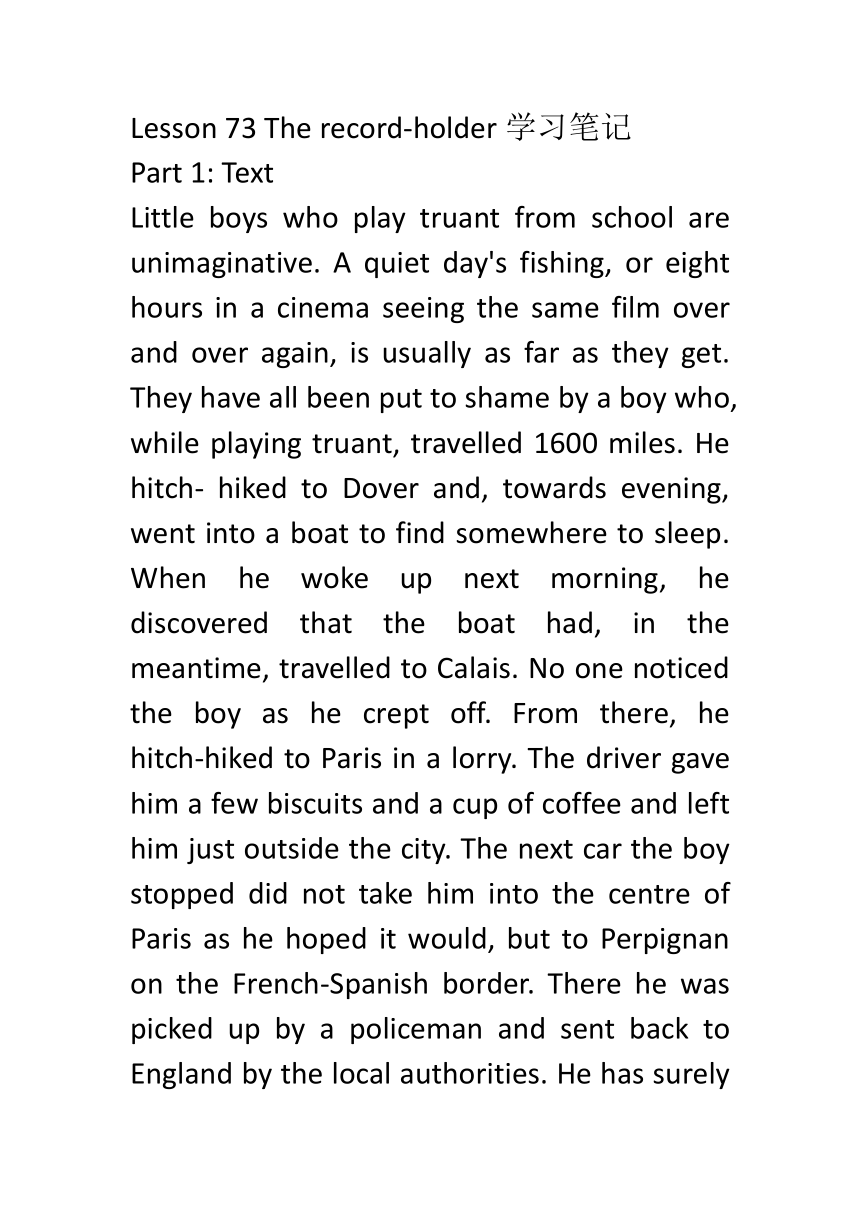 | |
| 格式 | docx | ||
| 文件大小 | 17.5KB | ||
| 资源类型 | 教案 | ||
| 版本资源 | 新概念英语 | ||
| 科目 | 英语 | ||
| 更新时间 | 2023-09-02 14:51:11 | ||
图片预览

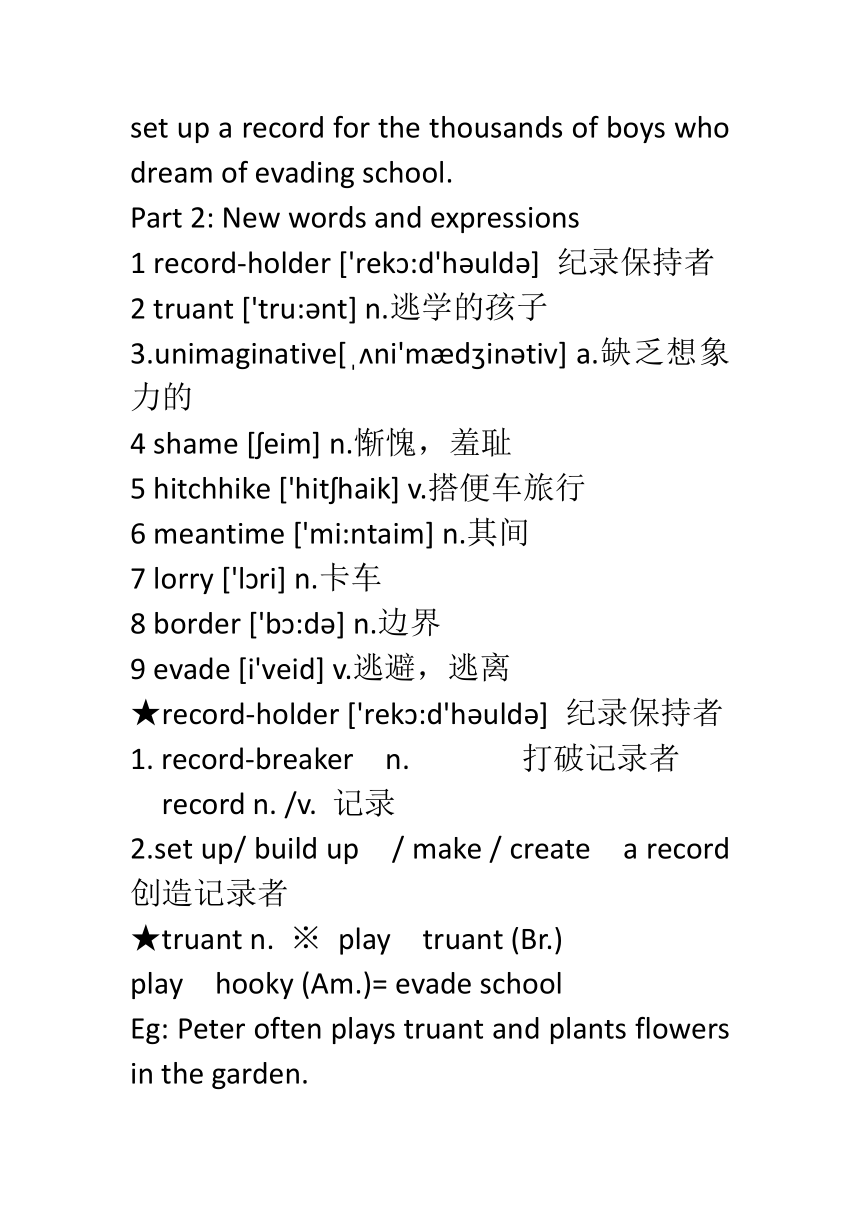
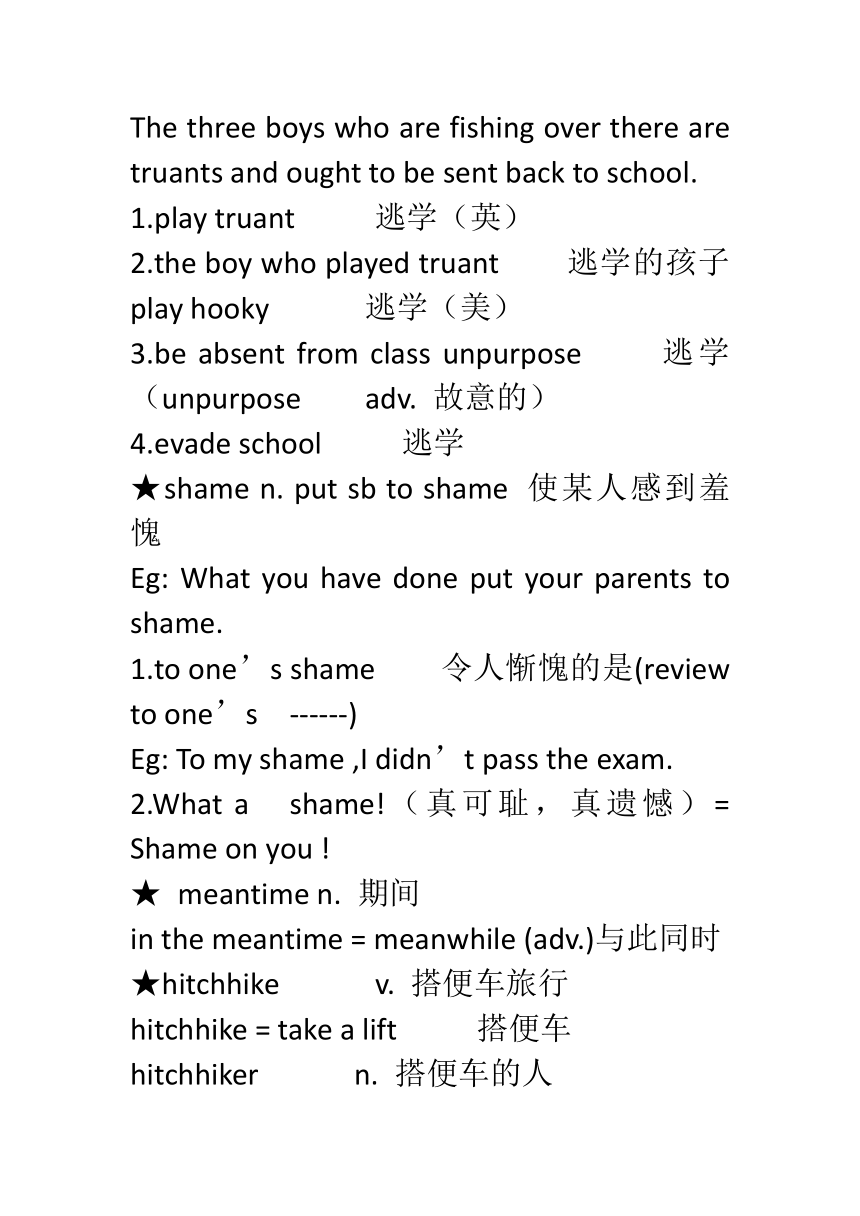
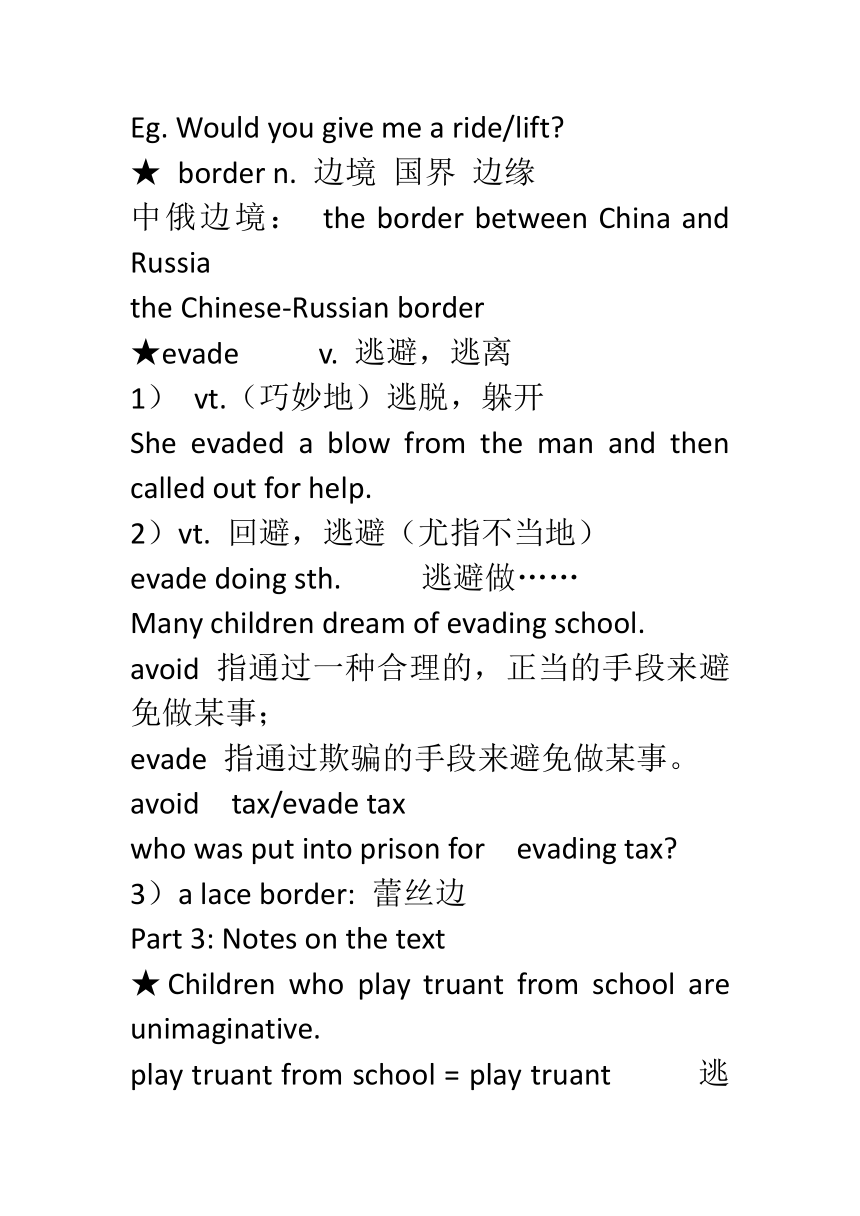
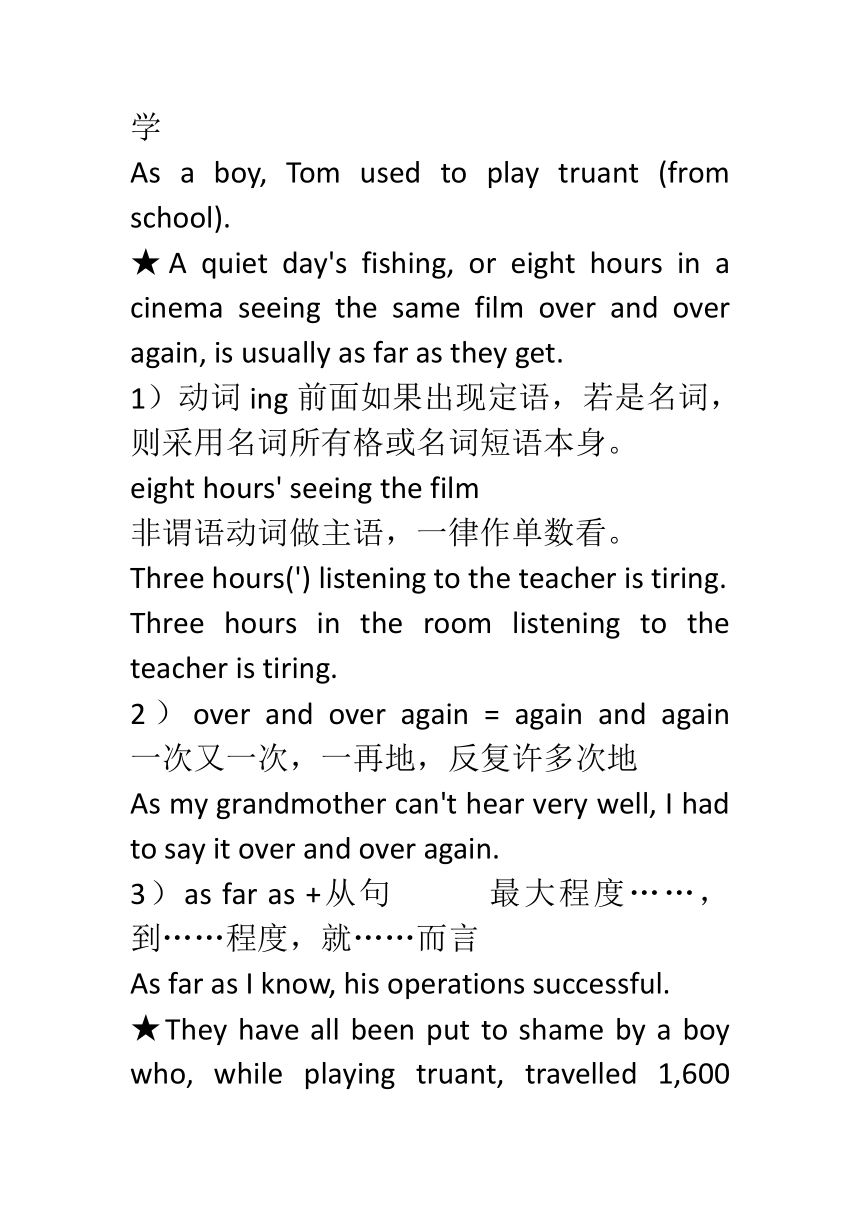
文档简介
Lesson 73 The record-holder学习笔记
Part 1: Text
Little boys who play truant from school are unimaginative. A quiet day's fishing, or eight hours in a cinema seeing the same film over and over again, is usually as far as they get. They have all been put to shame by a boy who, while playing truant, travelled 1600 miles. He hitch- hiked to Dover and, towards evening, went into a boat to find somewhere to sleep. When he woke up next morning, he discovered that the boat had, in the meantime, travelled to Calais. No one noticed the boy as he crept off. From there, he hitch-hiked to Paris in a lorry. The driver gave him a few biscuits and a cup of coffee and left him just outside the city. The next car the boy stopped did not take him into the centre of Paris as he hoped it would, but to Perpignan on the French-Spanish border. There he was picked up by a policeman and sent back to England by the local authorities. He has surely set up a record for the thousands of boys who dream of evading school.
Part 2: New words and expressions
1 record-holder ['rek :d'h uld ] 纪录保持者
2 truant ['tru: nt] n.逃学的孩子
3.unimaginative[ ni'm d in tiv] a.缺乏想象力的
4 shame [ eim] n.惭愧,羞耻
5 hitchhike ['hit haik] v.搭便车旅行
6 meantime ['mi:ntaim] n.其间
7 lorry ['l ri] n.卡车
8 border ['b :d ] n.边界
9 evade [i'veid] v.逃避,逃离
★record-holder ['rek :d'h uld ] 纪录保持者
1. record-breaker n. 打破记录者
record n. /v. 记录
2.set up/ build up / make / create a record 创造记录者
★truant n. ※ play truant (Br.)
play hooky (Am.)= evade school
Eg: Peter often plays truant and plants flowers in the garden.
The three boys who are fishing over there are truants and ought to be sent back to school.
1.play truant 逃学(英)
2.the boy who played truant 逃学的孩子 play hooky 逃学(美)
3.be absent from class unpurpose 逃学 (unpurpose adv. 故意的)
4.evade school 逃学
★shame n. put sb to shame 使某人感到羞愧
Eg: What you have done put your parents to shame.
1.to one’s shame 令人惭愧的是(review to one’s ------)
Eg: To my shame ,I didn’t pass the exam.
2.What a shame!(真可耻,真遗憾)= Shame on you !
★ meantime n. 期间
in the meantime = meanwhile (adv.)与此同时
★hitchhike v. 搭便车旅行
hitchhike = take a lift 搭便车
hitchhiker n. 搭便车的人
Eg. Would you give me a ride/lift
★ border n. 边境 国界 边缘
中俄边境: the border between China and Russia
the Chinese-Russian border
★evade v. 逃避,逃离
1) vt.(巧妙地)逃脱,躲开
She evaded a blow from the man and then called out for help.
2)vt. 回避,逃避(尤指不当地)
evade doing sth. 逃避做……
Many children dream of evading school.
avoid 指通过一种合理的,正当的手段来避免做某事;
evade 指通过欺骗的手段来避免做某事。
avoid tax/evade tax
who was put into prison for evading tax
3)a lace border: 蕾丝边
Part 3: Notes on the text
★Children who play truant from school are unimaginative.
play truant from school = play truant 逃学
As a boy, Tom used to play truant (from school).
★A quiet day's fishing, or eight hours in a cinema seeing the same film over and over again, is usually as far as they get.
1)动词ing前面如果出现定语,若是名词,则采用名词所有格或名词短语本身。
eight hours' seeing the film
非谓语动词做主语,一律作单数看。
Three hours(') listening to the teacher is tiring.
Three hours in the room listening to the teacher is tiring.
2)over and over again = again and again 一次又一次,一再地,反复许多次地
As my grandmother can't hear very well, I had to say it over and over again.
3)as far as +从句 最大程度……,到……程度,就……而言
As far as I know, his operations successful.
★They have all been put to shame by a boy who, while playing truant, travelled 1,600 miles.
1.while 引导时间状语从句,一般放在前面或后面,放在中间就加上逗号。
while doing 省略句,省略了主语和be 动词,这个主语一定就是主句的主语。
2.put…to shame 使……蒙羞,使……相形见绌
What he has done put his parents to shame.
He saved the child at the risk of his own life and put all those who looked on to shame.
他冒着生命危险救了那个孩子,使所有旁观者都相形见绌。
★He hitchhiked to Dover and, towards evening, went into a boat to find somewhere to sleep.
1.hitchhike to… 搭便车去……
2.Dover n. 多佛(英国著名的港口)
3.towards evening 快到晚上
4.somewhere to sleep 可以睡觉的地方
anything to do/drink 可以做的事/可以喝的东西(这里 to do 做定语)
★When he woke up next morning, he discovered that the boat had, in the meantime, travelled to Calais.
1.wake up 自己醒来
2.Calais n. 加来(法国城市)
in the meantime 在此期间
★No one noticed the boy as he crept off.
creep off = creep away ★creep
1)vi. 爬行,匍匐,(像爬行似地)慢慢前进
The old car crept along the country road.
A snake crept into the garden while she was writing a letter.
2)vi. 悄悄地/蹑手蹑脚地走;渐渐产生/出现
We crept upstairs so as not to wake Grandpa.
He noticed that age had crept on him.
★The next car the boy stopped did not take him into the centre of Paris as he hoped it would, but to Perpignan on the French-Spanish border.
1.take … into 带到……
2.not…but… 不是……而是……
3.as sb. hoped 正如某人所希望的
I became a good teacher as my mother hopes. than sb. expected 比某人所期待的还……
Don't ask what the country do for you, but ask what you do for the country.
the French-Spanish border 法国与西班牙的边界 (边界地带属于哪个地方由第一个国籍确定)
★There he was picked up by a policeman and sent back to England by the local authorities.
pick up 逮捕,拘捕
Part 4: Grammar&Difficult points
主谓一致
所谓“主谓一致”就是指谓语动词在人称和数上必须和主语保持一致。
1.动词不定式、动名词,或者主语从句作主语时,谓语动词一般用单数形式。如:
What we want is some water.我们需要水。
To say something is usually easier than to do something.
说一些事往往要比做一些事容易。
Whether he will come is still unknown.
他是否会来还不知道。
Seeing is believing.
注:
1)当若干个动词不定式,动名词或主语从句被and连接起来当主语时,谓语动词一般用复数形式。如:
he says and what he does don’t agree.他言行不一致。
Where he comes from and what he is doing here are secrets.
他来自哪儿和他在这儿干什么都是谜。
2)由what引导的主语从句,谓语动词通常用单数,但所指的具体内容若是复数意义时,谓语动词一般用复数形式。如:
What we need is more time.
What we need are doctors.
2.“就近一致”原则。
当一个句子有两个主语,这两主语又是由“not only…but also”, “either…or…”“neither…nor”连接起来时,谓语动词和离它最近的主语保持一致。如:
Not only he but also I am good at English.我们俩英语都不错。
Either they or he is to come.不是他们就是他会来的
3.当名词词组中心词为表示度量、距离、金额、时间、书名等复数名词时,常作为一个整体来看,谓语动词用单数。
Five years is a long time to wait for an answer.
为了等待一个答复4年时间够长的。
4.由and连接的两个并列主语一般谓语动词用复数。如:
Plastics and rubber never rot。塑料与橡皮永远不会腐烂。注:当and连接的并列单数主语前分别有every, each, no, many a修饰时,谓语动词用单数。
In our country, every boy and every girl has the right to receive education.
5.谓语动词与前面的主语一致
当主语后面跟有with, together with, like, except, but, noless than, as well as等词引起的短语时,谓语动词与前面的主语一致。
The teacher together with some students is visiting the factory.
He as well as I wants to go boating.
6. 谓语需用单数
代词each和由every, some, no, any等构成的复合代词作主语,或主语中含有each, every, 谓语需用单数。
Each of us has a tape-recorder.
There is something wrong with my watch.
7.指代意义决定谓语的单复数
1)在代词what, which, who, none, some, any, more, most, all等词的单复数由其指代的词的单复数决定。
All is right. (一切顺利。)
All are present. (所有人都到齐了。)
2) 集体名词作主语时,谓语的数要根据主语的意思来决定。如family, audience, crew, crowd, class, company, committee等词后用复数形式时,意为这个集体中的各个成员,用单数时表示该个集体。
他家不是一个大家庭。 His family isn't very large.
His family are music lovers. 他的家人都是音乐爱好者。
但集合名词people, police, cattle, poultry等在任何情况下都用复数形式。
Are there any police around
8.有些名词,如variety, number, population, proportion, majority等有时看作单数,有时看作复数。
A number of +名词复数+复数动词。
The number of +名词复数+单数动词。
A number of books have lent out.
The majority of the students like English.
9. 与后接名词或代词保持一致
1) 用half of, part of, most of, a portion of等词引起主语时,动词通常与of后面的名词,代词保持一致。
Most of his money is spent on books.
Most of the students are taking an active part in sports.
2) 在一些短语,如 many a或 more than one所修饰的词作主语时,谓语动词多用单数形式。但是more than… of作主语时,动词应与其后的名词或代词保持一致。
Many a person has read the novel. 许多人都读过这本书。
Part 1: Text
Little boys who play truant from school are unimaginative. A quiet day's fishing, or eight hours in a cinema seeing the same film over and over again, is usually as far as they get. They have all been put to shame by a boy who, while playing truant, travelled 1600 miles. He hitch- hiked to Dover and, towards evening, went into a boat to find somewhere to sleep. When he woke up next morning, he discovered that the boat had, in the meantime, travelled to Calais. No one noticed the boy as he crept off. From there, he hitch-hiked to Paris in a lorry. The driver gave him a few biscuits and a cup of coffee and left him just outside the city. The next car the boy stopped did not take him into the centre of Paris as he hoped it would, but to Perpignan on the French-Spanish border. There he was picked up by a policeman and sent back to England by the local authorities. He has surely set up a record for the thousands of boys who dream of evading school.
Part 2: New words and expressions
1 record-holder ['rek :d'h uld ] 纪录保持者
2 truant ['tru: nt] n.逃学的孩子
3.unimaginative[ ni'm d in tiv] a.缺乏想象力的
4 shame [ eim] n.惭愧,羞耻
5 hitchhike ['hit haik] v.搭便车旅行
6 meantime ['mi:ntaim] n.其间
7 lorry ['l ri] n.卡车
8 border ['b :d ] n.边界
9 evade [i'veid] v.逃避,逃离
★record-holder ['rek :d'h uld ] 纪录保持者
1. record-breaker n. 打破记录者
record n. /v. 记录
2.set up/ build up / make / create a record 创造记录者
★truant n. ※ play truant (Br.)
play hooky (Am.)= evade school
Eg: Peter often plays truant and plants flowers in the garden.
The three boys who are fishing over there are truants and ought to be sent back to school.
1.play truant 逃学(英)
2.the boy who played truant 逃学的孩子 play hooky 逃学(美)
3.be absent from class unpurpose 逃学 (unpurpose adv. 故意的)
4.evade school 逃学
★shame n. put sb to shame 使某人感到羞愧
Eg: What you have done put your parents to shame.
1.to one’s shame 令人惭愧的是(review to one’s ------)
Eg: To my shame ,I didn’t pass the exam.
2.What a shame!(真可耻,真遗憾)= Shame on you !
★ meantime n. 期间
in the meantime = meanwhile (adv.)与此同时
★hitchhike v. 搭便车旅行
hitchhike = take a lift 搭便车
hitchhiker n. 搭便车的人
Eg. Would you give me a ride/lift
★ border n. 边境 国界 边缘
中俄边境: the border between China and Russia
the Chinese-Russian border
★evade v. 逃避,逃离
1) vt.(巧妙地)逃脱,躲开
She evaded a blow from the man and then called out for help.
2)vt. 回避,逃避(尤指不当地)
evade doing sth. 逃避做……
Many children dream of evading school.
avoid 指通过一种合理的,正当的手段来避免做某事;
evade 指通过欺骗的手段来避免做某事。
avoid tax/evade tax
who was put into prison for evading tax
3)a lace border: 蕾丝边
Part 3: Notes on the text
★Children who play truant from school are unimaginative.
play truant from school = play truant 逃学
As a boy, Tom used to play truant (from school).
★A quiet day's fishing, or eight hours in a cinema seeing the same film over and over again, is usually as far as they get.
1)动词ing前面如果出现定语,若是名词,则采用名词所有格或名词短语本身。
eight hours' seeing the film
非谓语动词做主语,一律作单数看。
Three hours(') listening to the teacher is tiring.
Three hours in the room listening to the teacher is tiring.
2)over and over again = again and again 一次又一次,一再地,反复许多次地
As my grandmother can't hear very well, I had to say it over and over again.
3)as far as +从句 最大程度……,到……程度,就……而言
As far as I know, his operations successful.
★They have all been put to shame by a boy who, while playing truant, travelled 1,600 miles.
1.while 引导时间状语从句,一般放在前面或后面,放在中间就加上逗号。
while doing 省略句,省略了主语和be 动词,这个主语一定就是主句的主语。
2.put…to shame 使……蒙羞,使……相形见绌
What he has done put his parents to shame.
He saved the child at the risk of his own life and put all those who looked on to shame.
他冒着生命危险救了那个孩子,使所有旁观者都相形见绌。
★He hitchhiked to Dover and, towards evening, went into a boat to find somewhere to sleep.
1.hitchhike to… 搭便车去……
2.Dover n. 多佛(英国著名的港口)
3.towards evening 快到晚上
4.somewhere to sleep 可以睡觉的地方
anything to do/drink 可以做的事/可以喝的东西(这里 to do 做定语)
★When he woke up next morning, he discovered that the boat had, in the meantime, travelled to Calais.
1.wake up 自己醒来
2.Calais n. 加来(法国城市)
in the meantime 在此期间
★No one noticed the boy as he crept off.
creep off = creep away ★creep
1)vi. 爬行,匍匐,(像爬行似地)慢慢前进
The old car crept along the country road.
A snake crept into the garden while she was writing a letter.
2)vi. 悄悄地/蹑手蹑脚地走;渐渐产生/出现
We crept upstairs so as not to wake Grandpa.
He noticed that age had crept on him.
★The next car the boy stopped did not take him into the centre of Paris as he hoped it would, but to Perpignan on the French-Spanish border.
1.take … into 带到……
2.not…but… 不是……而是……
3.as sb. hoped 正如某人所希望的
I became a good teacher as my mother hopes. than sb. expected 比某人所期待的还……
Don't ask what the country do for you, but ask what you do for the country.
the French-Spanish border 法国与西班牙的边界 (边界地带属于哪个地方由第一个国籍确定)
★There he was picked up by a policeman and sent back to England by the local authorities.
pick up 逮捕,拘捕
Part 4: Grammar&Difficult points
主谓一致
所谓“主谓一致”就是指谓语动词在人称和数上必须和主语保持一致。
1.动词不定式、动名词,或者主语从句作主语时,谓语动词一般用单数形式。如:
What we want is some water.我们需要水。
To say something is usually easier than to do something.
说一些事往往要比做一些事容易。
Whether he will come is still unknown.
他是否会来还不知道。
Seeing is believing.
注:
1)当若干个动词不定式,动名词或主语从句被and连接起来当主语时,谓语动词一般用复数形式。如:
he says and what he does don’t agree.他言行不一致。
Where he comes from and what he is doing here are secrets.
他来自哪儿和他在这儿干什么都是谜。
2)由what引导的主语从句,谓语动词通常用单数,但所指的具体内容若是复数意义时,谓语动词一般用复数形式。如:
What we need is more time.
What we need are doctors.
2.“就近一致”原则。
当一个句子有两个主语,这两主语又是由“not only…but also”, “either…or…”“neither…nor”连接起来时,谓语动词和离它最近的主语保持一致。如:
Not only he but also I am good at English.我们俩英语都不错。
Either they or he is to come.不是他们就是他会来的
3.当名词词组中心词为表示度量、距离、金额、时间、书名等复数名词时,常作为一个整体来看,谓语动词用单数。
Five years is a long time to wait for an answer.
为了等待一个答复4年时间够长的。
4.由and连接的两个并列主语一般谓语动词用复数。如:
Plastics and rubber never rot。塑料与橡皮永远不会腐烂。注:当and连接的并列单数主语前分别有every, each, no, many a修饰时,谓语动词用单数。
In our country, every boy and every girl has the right to receive education.
5.谓语动词与前面的主语一致
当主语后面跟有with, together with, like, except, but, noless than, as well as等词引起的短语时,谓语动词与前面的主语一致。
The teacher together with some students is visiting the factory.
He as well as I wants to go boating.
6. 谓语需用单数
代词each和由every, some, no, any等构成的复合代词作主语,或主语中含有each, every, 谓语需用单数。
Each of us has a tape-recorder.
There is something wrong with my watch.
7.指代意义决定谓语的单复数
1)在代词what, which, who, none, some, any, more, most, all等词的单复数由其指代的词的单复数决定。
All is right. (一切顺利。)
All are present. (所有人都到齐了。)
2) 集体名词作主语时,谓语的数要根据主语的意思来决定。如family, audience, crew, crowd, class, company, committee等词后用复数形式时,意为这个集体中的各个成员,用单数时表示该个集体。
他家不是一个大家庭。 His family isn't very large.
His family are music lovers. 他的家人都是音乐爱好者。
但集合名词people, police, cattle, poultry等在任何情况下都用复数形式。
Are there any police around
8.有些名词,如variety, number, population, proportion, majority等有时看作单数,有时看作复数。
A number of +名词复数+复数动词。
The number of +名词复数+单数动词。
A number of books have lent out.
The majority of the students like English.
9. 与后接名词或代词保持一致
1) 用half of, part of, most of, a portion of等词引起主语时,动词通常与of后面的名词,代词保持一致。
Most of his money is spent on books.
Most of the students are taking an active part in sports.
2) 在一些短语,如 many a或 more than one所修饰的词作主语时,谓语动词多用单数形式。但是more than… of作主语时,动词应与其后的名词或代词保持一致。
Many a person has read the novel. 许多人都读过这本书。
同课章节目录
